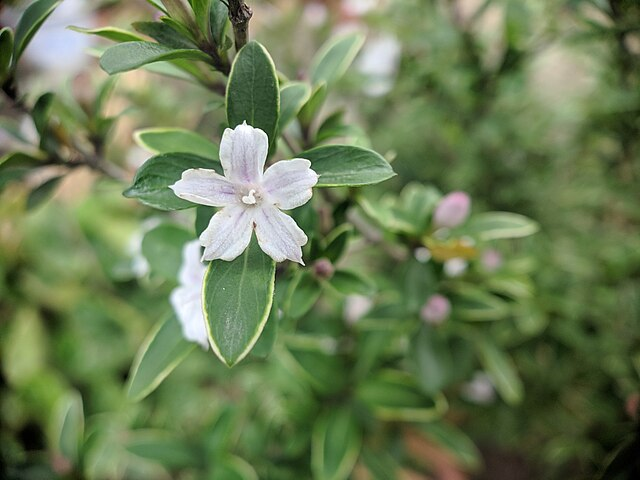Snowrose
(Buchozia japonica)
Snowrose (Buchozia japonica)
/
/

Sun Jiao (Interaccoonale)
CC BY 4.0
Image By:
Sun Jiao (Interaccoonale)
Recorded By:
Copyright:
CC BY 4.0
Copyright Notice:
Photo by: Sun Jiao (Interaccoonale) | License Type: CC BY 4.0 | License URL: http://creativecommons.org/publicdomain/zero/1.0/deed.en | Uploader: Interaccoonale | Publisher: Wikimedia Commons |




Estimated Native Range
Summary
Buchozia japonica, synonym Serissa japonica, commonly known as Snowrose or Tree of a Thousand Stars, is an evergreen or semi-deciduous shrub native to open woodlands and forest edges in Southeast Asia. It typically grows to a height of 18-24 inches and is characterized by its deep green leaves, which emit an unpleasant smell when bruised. The shrub is adorned with white, funnel-shaped flowers that are quite showy and bloom year-round, contributing to its long flowering period. The flowers are small but prolific, creating a starry effect that is highly valued in ornamental horticulture.
Snowrose is renowned for its neat growth habit and dense branch coverage, making it a favored choice for bonsai cultivation. It thrives in well-drained, fertile soil and prefers a humid environment with partial shade to full sun exposure. Regular watering is essential, but the plant is sensitive to overwatering and changes in its environment or care routine. Numerous cultivars have been developed, offering variations such as double flowers or variegated foliage. In cultivation, it is also used for its ornamental appeal in container gardens, as a houseplant, and in small urban gardens. However, gardeners should be aware of its sensitivity to cold temperatures and its susceptibility to pests like aphids and spider mites.CC BY-SA 4.0
Snowrose is renowned for its neat growth habit and dense branch coverage, making it a favored choice for bonsai cultivation. It thrives in well-drained, fertile soil and prefers a humid environment with partial shade to full sun exposure. Regular watering is essential, but the plant is sensitive to overwatering and changes in its environment or care routine. Numerous cultivars have been developed, offering variations such as double flowers or variegated foliage. In cultivation, it is also used for its ornamental appeal in container gardens, as a houseplant, and in small urban gardens. However, gardeners should be aware of its sensitivity to cold temperatures and its susceptibility to pests like aphids and spider mites.CC BY-SA 4.0
Plant Description
- Plant Type: Shrub
- Height: 2-4 feet
- Width: 3-5 feet
- Growth Rate: Moderate
- Flower Color: Pink, White
- Flowering Season: Fall
- Leaf Retention: Evergreen
Growth Requirements
- Sun: Part Shade
- Water: Medium
- Drainage: Medium
Common Uses
Border Plant, Low Maintenance, Potted Plant
Natural Habitat
native to open woodlands and forest edges in Southeast Asia
Other Names
Common Names:
Scientific Names: , Buchozia japonica, Buchozia coprosmoides, Buchozia coprosmoides, Democritea serissoides, Dysoda fasciculata, Dysoda foetida, Leptodermis nervosa, Leptodermis venosa, Lycium foetidum
GBIF Accepted Name: